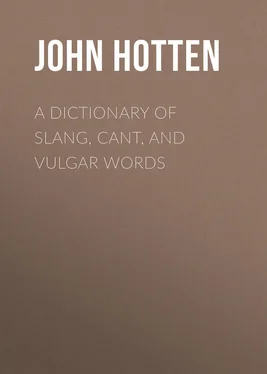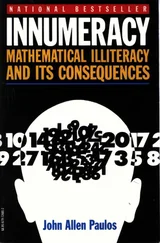John Hotten - A Dictionary of Slang, Cant, and Vulgar Words
Здесь есть возможность читать онлайн «John Hotten - A Dictionary of Slang, Cant, and Vulgar Words» — ознакомительный отрывок электронной книги совершенно бесплатно, а после прочтения отрывка купить полную версию. В некоторых случаях можно слушать аудио, скачать через торрент в формате fb2 и присутствует краткое содержание. ISBN: , Жанр: foreign_antique, foreign_prose, на английском языке. Описание произведения, (предисловие) а так же отзывы посетителей доступны на портале библиотеки ЛибКат.
- Название:A Dictionary of Slang, Cant, and Vulgar Words
- Автор:
- Жанр:
- Год:неизвестен
- ISBN:http://www.gutenberg.org/ebooks/47018
- Рейтинг книги:3 / 5. Голосов: 1
-
Избранное:Добавить в избранное
- Отзывы:
-
Ваша оценка:
- 60
- 1
- 2
- 3
- 4
- 5
A Dictionary of Slang, Cant, and Vulgar Words: краткое содержание, описание и аннотация
Предлагаем к чтению аннотацию, описание, краткое содержание или предисловие (зависит от того, что написал сам автор книги «A Dictionary of Slang, Cant, and Vulgar Words»). Если вы не нашли необходимую информацию о книге — напишите в комментариях, мы постараемся отыскать её.
A Dictionary of Slang, Cant, and Vulgar Words — читать онлайн ознакомительный отрывок
Ниже представлен текст книги, разбитый по страницам. Система сохранения места последней прочитанной страницы, позволяет с удобством читать онлайн бесплатно книгу «A Dictionary of Slang, Cant, and Vulgar Words», без необходимости каждый раз заново искать на чём Вы остановились. Поставьте закладку, и сможете в любой момент перейти на страницу, на которой закончили чтение.
Интервал:
Закладка:
I cannot close this subject without drawing attention to the extraordinary fact, that actually on the threshold of the gibbet the sign of the vagabond is to be met with! “The murderer’s signal is even exhibited from the gallows; as a red handkerchief held in the hand of the felon about to be executed is a token that he dies without having betrayed any professional secrets.” 34
Since the first edition of this work was published the author has received from various parts of England numerous evidences of the still active use of beggars’ marks, and mendicant hieroglyphics. One gentleman writes from Great Yarmouth to say that only a short time since, whilst residing in Norwich, he used frequently to see them on the houses and street corners. From another gentleman, a clergyman, I learn that he has so far made himself acquainted with the meanings of the signs employed, that by himself marking the characters  ( Gammy ) or
( Gammy ) or  ( Flummuxed ) on the gate posts of his parsonage, he enjoys a singular immunity from alms-seekers of all orders.
( Flummuxed ) on the gate posts of his parsonage, he enjoys a singular immunity from alms-seekers of all orders.
THE HISTORY OF SLANG, OR THE VULGAR LANGUAGE OF FAST LIFE
Slang is the language of street humour, of fast, high, and low life. Cant, as was stated in the chapter upon that subject, is the vulgar language of secrecy. They are both universal and ancient, and appear to have been the peculiar concomitants of gay, vulgar, or worthless persons in every part of the world, at every period of time. Indeed, if we are to believe implicitly the saying of the wise man, that “there is nothing new under the sun,” the “fast” men of buried Nineveh, with their knotty and door-matty looking beards, may have cracked Slang jokes on the steps of Sennacherib’s palace; and the stocks and stones of Ancient Egypt, and the bricks of venerable and used-up Babylon, may, for aught we know, be covered with Slang hieroglyphics unknown to modern antiquarians, and which have long been stumbling-blocks to the philologist; so impossible is it at this day to say what was then authorised, or what then vulgar language. Slang is as old as speech and the congregating together of people in cities. It is the result of crowding, and excitement, and artificial life. Even to the classics it was not unknown, as witness the pages of Aristophanes and Plautus, Terence and Athenæus. Martial, the epigrammatist, is full of Slang. When an uninvited guest accompanied his friend, the Slang of the day styled him his UMBRA; when a man was trussed, neck and heels, it called him jocosely QUADRUPUS.
Old English Slang was coarser, and depended more upon downright vulgarity than our modern Slang. It was a jesting speech, or humorous indulgence for the thoughtless moment, or the drunken hour, and it acted as a vent-peg for a fit of temper or irritability; but it did not interlard and permeate every description of conversation as now. It was confined to nick-names and improper subjects, and encroached but to a very small extent upon the domain of authorised speech. Indeed, it was exceedingly limited when compared with the vast territory of Slang in such general favour and complete circulation at the present day. Still, although not an alarming encumbrance, as in our time, Slang certainly did exist in this country centuries ago, as we may see if we look down the page of any respectable History of England. Cromwell was familiarly called OLD NOLL, – just the same as Buonaparte was termed BONEY, and Wellington CONKEY, or NOSEY, only a few years ago. His Legislature, too, was spoken of in a high-flavoured way as the BAREBONES, or RUMP Parliament, and his followers were nicknamed ROUNDHEADS, and the peculiar religious sects of his protectorate were styled PURITANS and QUAKERS. 35The Civil War pamphlets, and the satirical hits of the Cavaliers and the Commonwealth men, originated numerous Slang words and vulgar similes, in full use at the present moment. Here is a field of inquiry for the Philological Society, indeed I may say a territory, for there are thirty thousand of these partisan tracts. Later still, in the court of Charles the Second, the naughty ladies and the gay lords, with Rochester at their head, talked Slang; and very naughty Slang it was too! Fops, in those days, when “over head and ears” in debt, and in continual fear of arrest, termed their enemies, the bailiffs, PHILISTINES 36or MOABITES. At a later period, when collars were worn detached from shirts, in order to save the expense of washing – an object it would seem with needy “swells” in all ages – they obtained the name of JACOBITES. One half of the coarse wit in Butler’s Hudibras lurks in the vulgar words and phrases which he was so fond of employing. They were more homely and forcible than the mild and elegant sentences of Cowley, and the people, therefore, hurrah’d them, and pronounced Butler one of themselves, – or, as we should say, in a joyful moment, a jolly good fellow. Orator Henley preached and prayed in Slang, and first charmed and then swayed the dirty mobs in Lincoln’s Inn Fields by vulgarisms. Burly Grose mentions Henley, with the remark that we owe a great many Slang phrases to him. Swift, and old Sir Roger L’Estrange, and Arbuthnot, were all fond of vulgar or Slang language; indeed, we may see from a Slang word used by the latter how curious is the gradual adoption of vulgar terms in our standard dictionaries. The worthy doctor, in order to annihilate (or, as we should say with a fitting respect to the subject under consideration, SMASH) an opponent, thought proper on an occasion to use the word CABBAGE, not in the ancient and esculentary sense of a flatulent vegetable of the kitchen garden, but in the at once Slang sense of purloining or cribbing. Johnson soon met with the word, looked at it, examined it, weighed it, and shook his head, but out of respect to a brother doctor inserted it in his dictionary, labelling it, however, prominently “ Cant ;” whilst Walker and Webster, years after, when to cabbage was to pilfer all over England, placed the term in their dictionaries as an ancient and very respectable word. Another Slang term, GULL, to cheat, or delude, sometimes varied to GULLY, is stated to be connected with the Dean of St. Patrick. Gull, a dupe, or a fool, is often used by our old dramatists, and is generally believed to have given rise to the verb; but a curious little edition of Bamfylde Moore Carew , published in 1827, says that TO GULL, or GULLY, is derived from the well known Gulliver , the hero of the famous Travels . How crammed with Slang are the dramatic works of the last century! The writers of the comedies and farces in those days must have lived in the streets, and written their plays in the public-houses, so filled are they with vulgarisms and unauthorised words. The popular phrases, “I owe you one,” “that’s one for his nob,” and “keep moving, dad,” arose in this way. 37The second of these sayings was, doubtless, taken from the card table, for at cribbage the player who holds the knave of the suit turned up counts “one for his nob,” and the dealer who turns up a knave counts “two for his heels.”
In Mrs. Centlivre’s admirable comedy of A Bold Stroke for a Wife , we see the origin of that popular street phrase, THE REAL SIMON PURE. Simon Pure is the Quaker name adopted by Colonel Feignwell as a trick to obtain the hand of Mistress Anne Lovely in marriage. The veritable Quaker, the “real Simon Pure,” recommended by Aminadab Holdfast, of Bristol, as a fit sojourner with Obadiah Prim, arrives at last to the discomfiture of the Colonel, who, to maintain his position and gain time, concocts a letter in which the real Quaker is spoken of as a housebreaker who had travelled in the “leather conveniency” from Bristol, and adopted the garb and name of the Western Quaker in order to pass off as the “REAL SIMON PURE,” but only for the purpose of robbing the house and cutting the throat of the perplexed Obadiah. The scene in which the two Simon Pures, the real and the counterfeit , meet, is one of the best in the comedy.
Читать дальшеИнтервал:
Закладка:
Похожие книги на «A Dictionary of Slang, Cant, and Vulgar Words»
Представляем Вашему вниманию похожие книги на «A Dictionary of Slang, Cant, and Vulgar Words» списком для выбора. Мы отобрали схожую по названию и смыслу литературу в надежде предоставить читателям больше вариантов отыскать новые, интересные, ещё непрочитанные произведения.
Обсуждение, отзывы о книге «A Dictionary of Slang, Cant, and Vulgar Words» и просто собственные мнения читателей. Оставьте ваши комментарии, напишите, что Вы думаете о произведении, его смысле или главных героях. Укажите что конкретно понравилось, а что нет, и почему Вы так считаете.












